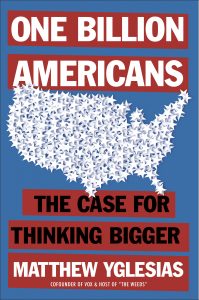No, the U.S. Is Not "Extremely Undercrowded"
Written by Marian Starkey, Vice President for Communications | Published: December 14, 2020
Tripling the American Population to Compete With China Is Not Thinking Bigger, It’s Thinking Dumber.
 What a simpler world this would be if old school economics were our only concern—if we didn’t need to worry about natural resource availability or the earth’s capacity to absorb our various forms of waste. Reading Matthew Yglesias’ new book One Billion Americans: The Case for Thinking Bigger might lead you to believe that we live in such a world.
What a simpler world this would be if old school economics were our only concern—if we didn’t need to worry about natural resource availability or the earth’s capacity to absorb our various forms of waste. Reading Matthew Yglesias’ new book One Billion Americans: The Case for Thinking Bigger might lead you to believe that we live in such a world.
We don’t.
The premise of the book is that in order to hold onto the title of world’s biggest superpower (USA! USA! USA!), we need to compete in population size with China. And since China has over a billion people, we need a billion people too. The author sees no problem with tripling the American population—since, according to him, we’re currently “extremely undercrowded” and “many American cities and increasingly their suburbs are clearly underpopulated”—as long as all of that people power keeps us in the top spot of global economic powers.
The author’s ideas for accommodating another 670 million people include tearing down existing homes (including historic ones) and building high-rises where they’re currently not zoned, widening roads and investing in German-style city rail systems to cut down on the inevitable traffic jams more people would create, and training workers whose jobs could be automated to become childcare providers for the millions of additional babies people would have if only there was better paid parental leave and affordable after-school care.
The author admits that he has only one child and lives in a historic townhouse in DC. He assures the reader that different people have different preferences. Of course they do, but it’s hard not to think he’s suggesting a different way of life for other people but not for himself. (“We can and should stay number one forever, but it’s going to mean knocking down some old buildings …” Just not the one he lives in, one presumes.)
Investing in better commuter rail service in order to get cars off the road is a great idea. Many of Yglesias’ policy ideas are of this variety—items we should prioritize in order to improve quality of life and reduce per capita pressure on the environment. Where he loses me is in pushing for these policies in order to cram hundreds of millions more people into our cities, suburbs, and wildlands.
In hashing out all the intricate details of how we could make cities denser, encourage “Americans and … those who would like to become Americans” to settle in Rust Belt cities whose populations have declined (one of his ideas: add more frequent flights to major cities, but don’t worry—in this fantasy, planes are electric!), and restructure our tax code and public services to enable people to have the number of children they say they ideally would like to have[1], Yglesias almost completely ignores the environmental repercussions of tripling the American population (in fact, he repeatedly warns against “ecopessimism” and says, “There is plenty of room out there for big houses and big lawns”). The environment is almost an afterthought—with the only real discussion relegated to the final chapter of the book, and even then, he nonsensically tries to refute environmental limitations one by one, painting a picture of an eco-conscious utopia where American individuals, corporations, and politicians take benevolent care of our environment despite the widespread lack of will to do so in real life. He urges us to avoid “going overboard in describing our environmental problems,” when considering how many children to have. Yglesias even says that the U.S. “not only has lots of land that could accommodate more people, it has lots of land that would clearly benefit from more inhabitants.” The very idea of there being any wild land anywhere that would benefit from human habitation is absurd.
If the entire book is a fantasy thought experiment, that’s his right. But if One Billion Americans is a real policy prescription, we should ignore it as naïve, harebrained and even dangerous should people in power take a liking to Yglesias’ ideas.
Matthew Yglesias co-founded Vox.com and is currently a senior correspondent focused on politics and economic policy. He has written two other books: The Rent Is Too Damn High: What To Do About It, And Why It Matters More Than You Think and Heads in the Sand: How the Republicans Screw Up Foreign Policy and Foreign Policy Screws Up the Democrats.
[1] The U.S. has a higher fertility rate than almost any European country, many of whom have implemented the very infrastructure improvements the author recommends. Women may report that their ideal fertility is 2.7 children, on average, but there’s a big difference between abstractly imagining three children as ideal and actually trying to conceive a third child once raising two is already a lived reality. And many women simply wait too long to start their childbearing to have the number of kids they say they want. Helping people in their twenties to be more financially secure would likely help a bit with this, but money isn’t the only reason people are waiting until later to have kids. Starting a career, finding the right partner, and having life experiences that are more difficult once children come along also play a part. Does he have policy prescriptions for those things as well?

